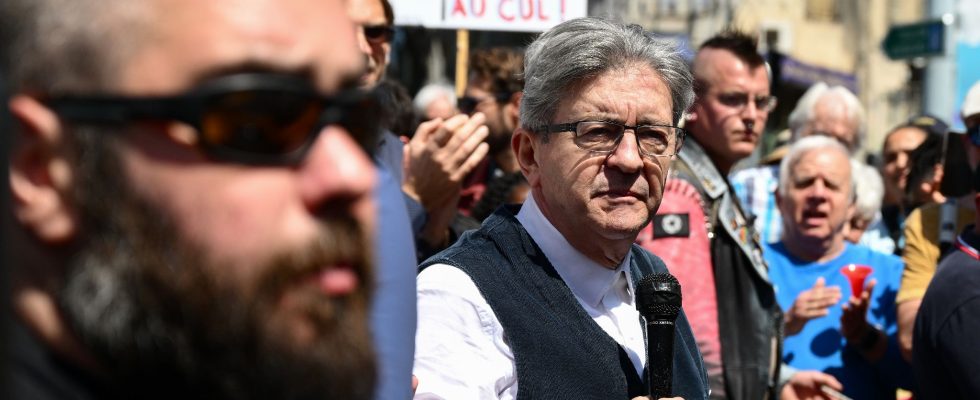A chill ran through the left when, after the first two nights of urban riots following Nahel’s death, Jean-Luc Mélenchon refused to call for calm. The anti-Nupes left overwhelms him, the right and the presidential majority accuse him of condoning the violence and rename La France insoumise “La France incendiary”. To tell the truth, the Insoumis leader has never called for violence, neither there, nor at the time of the yellow vests in 2018, nor when the demonstrations against the pension reform were tense with the police. “I absolutely disagree with so-called revolutionary violence because it stunts the revolutionary process,” he said in an interview with the Review of the Two Worlds in October 2022. This is undoubtedly what still differentiates it from the far left, which claims the rejection of institutions and believes that a revolution cannot go through the ballot box. But Mélenchon – whose last blog post resonates with the animosity of the subject, we will come back to this – did not call for calm either, and it is in this interstice, in this refusal to temper, his lack of clarity vis -à-vis the violence of the street, which has resurfaced a (very) old debate on the left.
So old that it must be admitted that this camp has always had a passionate relationship with the question of violence. It’s almost a mantra: any bubbling movement born in the streets has its political justification. “One of the specificities of the left, whether socialists, communists or those who inherit these political traditions, is to refuse that politics be limited to the sphere of the state, to elections and to the devices of the institutional order which frame the forms of expression of the people”, explains Milo Lévy-Bruhl, philosopher, specialist in socialism and a certain Léon Blum, also confronted in his time with the same question: what purpose politics to violence? During the Congress of Tours in 1920, he jostled, in vain, those of the SFIO tempted by the communism of Lenin: “Open your Party card. What is the object that the Socialist Party gives itself? The transformation of the economic system. Open the statutes of the Communist International. What is the goal? The armed struggle against bourgeois power.”
“Democracy is me!”
Fourteen years earlier, Clemenceau and Jaurès clashed on the same question. In 1906, the strikes of the miners push the Tiger, then Minister of the Interior, to have Paris occupied by the army. To the unions, he says: “Your means of action is disorder. My duty is to bring order. And Jaurès replies: “There is no arbitration between classes other than force because society itself is the expression of force.” The pass of arms invites itself to the National Assembly, where Clemenceau castigates his former comrade: “The street does not belong to you, Mr. Jaurès, it belongs to everyone… You say the working class is me, the democracy is me!” Another time, other words, same divisions of the left.
This temptation to embrace violence, the left has often paid for it. In 1968, after the events of May, Pierre Mendès France and François Mitterrand appeared at the meeting at the Charléty stadium, and neither of them condemned the violent outbursts at the podium. Worse still, Mitterrand will propose, a few hours after the rally, “a provisional management government”, led by Mendès France. A temptation to surf on disorder. The mess, it was them in the eyes of the majority, and the left will suffer a heavy setback in the legislative elections the following month.
“No one is the boss of anything”
Will Mélenchon pay for his waltz-hesitation? The rebellious leader is caught in the crossfire, between two contradictory strategies. If France insubordinate is indeed a movement with electoral aims – whose sole objective is the presidential election – he knows that he will have to convince at least 50% of the voters, and, in fact, smooth his speech. During the last presidential election, in the early morning of the first round, when the results from overseas places him well ahead, Mélenchon sees himself in the second round. He prepares to “smooth” his speech, and calls Guillaume Lacroix, the leader of the radical left party, so critical of the too extreme line of the rebellious, to propose to him to see himself in between the two rounds, if ever…
Faced with this, there is “the other Mélenchon”, the one who sees in the excesses of the “street” a form of political criticism against the power which would justify his political line. “We must reflect in such circumstances and first seek to understand what is happening in order to find our useful place there. When the motivations are fair and legitimate, the observer, and even more so who feels connected to the circles concerned, cannot, in all rationality, be surprised at the violence, sometimes in fact totally uncontrolled, of the response”, explains the rebellious leader, on his blog on July 15, a week after the riots which followed the death of Nahel.
If he embraces this other strategy, it is because he is convinced that the good results of rebellious France in the neighborhoods during the presidential and legislative elections would give him the strength to be the spokesperson for this violent expression, to be the only one able to offer them a political outlet. To the rest of the left, who have criticized her in recent days, Mélenchon writes her “disgust” against her, “so traditional when she sees herself as a good conscience thirsty for respectability!” “There is of course a political and social dimension, but you have to be crazy to believe that political speech has any influence, that it can calm or even exalt. Nobody is the leader of anything, not even Jean-Luc”, analyzes a rebellious deputy, in conflict with his leader. Politics has changed and Mélenchon, even at his top 22%, never had the influence over the rioters or strikers of recent years that the 20th century socialists had over the labor unions.
